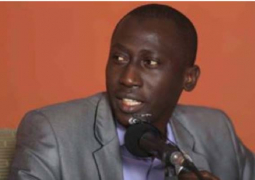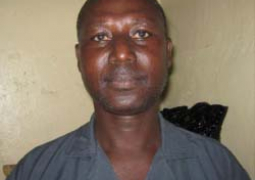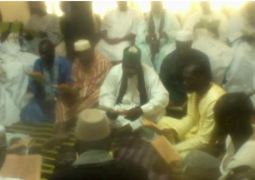Beakanyang Electoral Observer Team Report on the 24th November 2011 Presidential Election of The Gambia
BRIEF OVERVIEW OF BEAKANYANG
Beakanyang (Equal Opportunities for All) is a registered charitable, advocacy and development youth-led organization in the country.
It was founded in 2004 and has its head office located in the village of Barrow Kunda, Wuli West District of Upper River Region.
The key areas of our intervention include education and advocacy campaigns. The organization of recent has diversified its focus on the promotion of human rights, democracy and empowerment of women and youths.
Throughout this year, we have been engaged in women and youth empowerment activities mainly in the Upper River Region to achieve our goal.
AIMS AND OBJECTIVES OF BEAKANYANG
? To promote the participation of young people and women in the political, cultural and economic development of the country.
? To improve the socio-economic wellbeing of youth and women.
? To inculcate responsible citizens in youth and women in the Upper River Region and the country as a whole.
? To enhance youth and women participation in decision-making processes.
? To promote the protection of the rights of youth and women.
? To promote access to quality and relevant education to all children irrespective of their status.
? To promote good governance and democracy in The Gambia.
WHY WE OBSERVED THE NOVEMBER 24TH ELECTION?
Over the past six months Beakanyang with support from the US Embassy in Banjul has been involved in series of advocacy programmes including voter education campaign in the country, precisely in the Upper River Region, using the newly developed IEC voter education manual.
And in pursuance of our aim of upholding the virtue of democracy, good governance and human rights as well as to enhance the participation of young people and women in decision-making processes, coupled with the voter education we conducted and the training of observers, we want to:
? Observe the general participation of young people and women in the process and the public at large.
? Observe the general conduct of the election from voting to counting and announcement of results.
? Establish the credibility of the election process and the IEC in terms of logistics.
HOW WE OBSERVED THE ELECTION?
Beakanyang prior to the election trained a team of 15 young people, all members of the group, to serve as our observers:
? They were deployed on the ground a day before the election.
? Beakanyang team of observers covered the Upper River Region, Central River Region, North Bank Region, Banjul, Kanifing Municipality and West Coast Region.
? On Election Day, the team members went around touring polling stations as early as 5am.
? They stayed at each polling station observing the process for at least 45 minutes before leaving for another station.
? They witnessed the opening of stations and the start of voting.
? The Beakanyang observers also conducted interviews with assistant presiding officers and other IEC officials on the ground as well as party agents.
? The team members also witnessed the close of polls and sealing of ballot boxes.
? They accompanied the transportation of ballot boxes from polling stations to counting centres.
? Our men also visited counting centres in the regions where they observed the counting process.
WHAT WE OBSERVED ON ELECTION DAY
? We observed in all the polling stations visited at the opening of polls that voting started exactly at 7a.m. as promised by the IEC.
? Ballot boxes were emptied in the presence of party agents before voting started in areas we were present.
? No attempt of double voting was reported or witnessed by members of our team.
? There was no shortage of voting materials in all the polling stations we visited.
? No sign of intimidation or harassment was observed or reported.
? We observed a good voter turnout including more of young people and women.
? Most polls visited at closing did close at 4pm official time.
? Security was provided at polling stations throughout the voting process, from opening to closing, and for the transportation of ballot boxes to counting centres.
? Our team witnessed a generally orderly, calm and violence-free process in areas where we were present.
? Most polling officials behaved professionally and took their duties seriously and the voter turnout was impressive.
? The sick and old were given chance to vote without queuing thus creating no commotion in areas we observed.
? We observed other domestic and international observers, especially in Banjul, KM and CRR.
SHORTCOMINGS
? We observed that even though most polling stations closed on time ballot boxes were late to be transported to counting centres.
? We did observe that some voters, particularly at the Buffer Zone, Behind Latri Kunda Sabiji Market and at Bakoteh Bantaba polling stations, found it very difficult to locate their right polling stations to vote. They complained bitterly of staying on queues for hours only to be redirected to another polling stream and sometimes were redirected back to the queue they were or to a different stream.
? We observed that they applied ink on fingers of voters, which was time consuming compared to dipping of fingers into the ink.
? We observed that even on Election Day some people tried to campaign at the July 22nd Square and Gambia High School asking people to vote for their candidate (one of our observers deployed in Banjul was himself approached).
? Few counting centers were overcrowded.
? We observed a politician (National Assembly member) stationed at a polling station in Sandu Misra in URR, directing people to places where they should vote.
? We observed that not all parties had agents at all the polling stations.
? Some people came to vote lately, which brought some disagreement between them and IEC officials in charge of polling stations.
VOTES COUNTING
The Beakanyang team witnessed the counting of the votes at Gambia High School in Banjul, Wellingara Mix Farming Centre in Sererekunda East, Gunjur Junior Secondary School in Kombo South, Njaba Kunda Junior School in Central Baddibou, Sibanor Junior School in Foni Bintang, Bakadaji Upper Basic in Jimara, Diabugu Senior School in Sandu, Badari Basic School in Tumana, Nyakoi Senior School in Wuli West, Baja Kunda Basic Cycle in Wuli East, Nasir Senior School in Basse, Jarumeh Koto Basic Cycle in Sami and Fatoto Senior School in Kantora.
We observed that due to the late arrival of ballot boxes to the counting centres, counting started late and ended late in the morning.
The counting process was highly transparent, with party counting agents, observers, IEC officials all present at the scene where we observed.
In accordance with IEC regulations, the counting began only when all drums were delivered to the counting centres were we observed.
The presiding officer for each polling station read out details of the number of marbles received, the number of marbles issued to voters and the number of unused marbles as well as invalid votes where they occurred.
These were followed by officers proceeding with unsealing of drums sealed with unique numbers, to ensure their contents were not tampered with.
The counting was carried out in a professional manner though it was time-consuming, which led to the late finishing of counting till the following morning in most counting centres we observed.
The vote count was well executed, and observers and party agents accepted the results from all counting centres we observed.
Closing and vote-counting procedures were properly followed in all polling stations where Beakanyang observers were present. However, we observed in a few instances where polling staff had difficulty in reconciling the ballots tokens.
RECOMMENDATIONS
? We recommend that the IEC avoid bringing polling stations so close to each other, especially in areas where there are more than one stream.
? We also recommend that the IEC study ways to improve the counting process to make its faster and less time-consuming.
? We recommend that IEC and partners embark on massive voter education to teach people the DOs and DONTs on Election Day.
? We recommend that the IEC look at the means of improving the early transportation of ballot boxes to counting centres.
? More training of IEC staff on election duty is highly recommended.
? We recommend that the IEC ensure no one campaigns on Election Day.
? We strongly recommend that the IEC educate politicians so that no influential leader (politician) stations at the polling stations.
? We recommend that the IEC reintroduce the ink that was used in the 2006 presidential election since the type used this time around was time-consuming.
? The IEC should emphasise to political parties the importance of having a party agent in each of the polling stations.
? Let election duty certificates be issued to only those on IEC duty if it is to be given on election day.
? People should be sensitised to avoid coming out to vote late.
CONCLUSION
We would like to emphasise that the November 24th Presidential Election of The Republic of The Gambia was well organised and administered and was peaceful with an impressive voter turnout.
However, few irregularities were observed in few areas though not significant. We congratulate all those Gambians who took part in the election to exercise their political rights.
Finally, this report however is entirely based on what we observed on the eve of the election day, on and a day after the election.
Read Other Articles In Article (Archive)
Trial resumes of Gamcotrap officials
Apr 2, 2012, 12:51 PM




